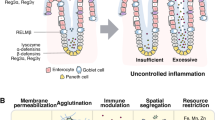Abstract.
The gastrointestinal tract of mammals is heavily colonized with a complex and dynamic microbial community. To cope with this complex microbial challenge, multiple epithelial lineages, such as enterocytes and Paneth cells, elaborate a diverse repertoire of protein antibiotics. The gut antimicrobial arsenal encompasses multiple protein families, including defensins, cathelicidins, and C-type lectins. These antimicrobial peptides and proteins play a key role in protecting the host against pathogen challenge, and likely also function to limit invasion of indigenous microbes. It is becoming increasingly apparent that expression of mucosal antimicrobial defenses is tightly controlled. This occurs at multiple levels, including transcriptional regulation in response to bacterial cues, post-translational proteolytic processing, and bacterial regulation of Paneth cell degranulation. Impaired antimicrobial peptide expression has also been implicated in inflammatory bowel disease, underscoring the essential role of antimicrobial defenses in maintaining intestinal homeostasis.
Similar content being viewed by others
Author information
Authors and Affiliations
Corresponding author
Additional information
Received 4 April 2008; received after revision 28 April 2008; accepted 30 April 2008
Rights and permissions
About this article
Cite this article
Mukherjee, S., Vaishnava, S. & Hooper, L.V. Multi-layered regulation of intestinal antimicrobial defense. Cell. Mol. Life Sci. 65, 3019–3027 (2008). https://doi.org/10.1007/s00018-008-8182-3
Published:
Issue Date:
DOI: https://doi.org/10.1007/s00018-008-8182-3




